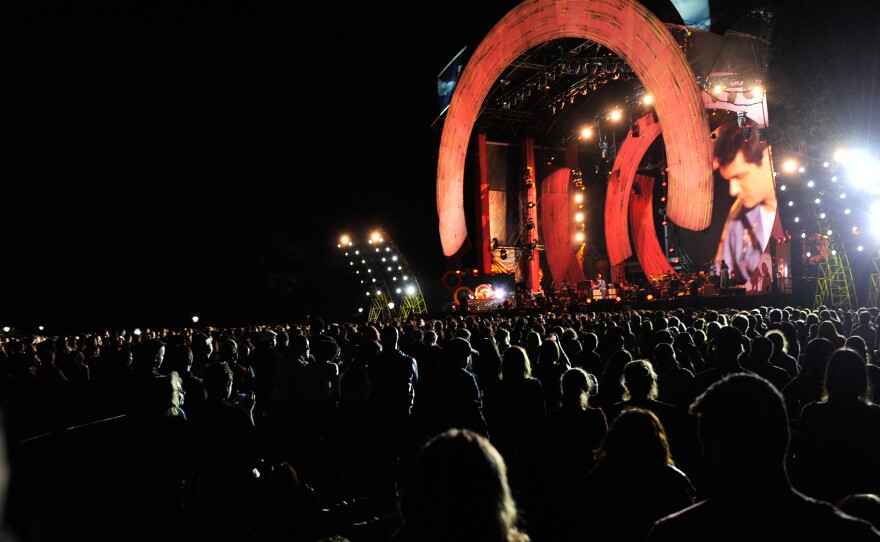Tomorrow in Central Park, Jay-Z will rap, Sting will sing and India's prime minister, Narendra Modi, will talk about the need to end open defecation — that's what they call it when people don't have access to toilets, and it's a huge global problem.
They're part of the impressive lineup at tomorrow's Global Citizen Festival in New York's Central Park. Some 60,000 people are expected to attend and millions more will tune in on MSNBC and NBC. The free concert is the flagship event of the Global Poverty Project, a nonprofit that began in 2008 with the ambitious goal of ending extreme poverty by 2030.
The organization is the brainchild of 31-year-old Hugh Evans, who at 14 visited the slums of Manila and soon decided his life's ambition was to eradicate poverty.
Evans, who's Australian, staged his first global citizen concert in 2012, drawing attention with his ability to book superstars like Foo Fighters, John Legend and Neil Young.
He also drew attention with his unusual ticket plan. Members of the general public can't buy their way into this concert, not for $50, $100 or $500. They have to earn admission.
The Global Poverty Project has come up with a clever tactic to make sure that concert-goers will pay attention to the issues as well as the celebrities. There's a lottery system to hand out the tickets, and people who engage in social activism increase their odds of getting a pass.
The points are tracked on the website globalcitizen.org, where participants register as a "global citizen." Then they navigate a series of quizzes, articles and campaigns on topics like sanitation, hunger and injustices that face women.
To earn one point, you can sign a petition calling on Congress to sponsor the Water for the World Act, a bill re-introduced last year that would make it a priority for the U.S. to improve access to clean water in lower-income countries. Sharing a quiz on open defecation with your friends through Twitter and Facebook will earn two more points.
And lots of points go to individuals who donate money to or volunteer for one of the many charities that have partnered with the Global Poverty Project — like Cotton on Foundation, which supports education for kids in Uganda, and sanitation nonprofit Wash United.
The funding to run the event and the organization comes from corporate sponsorships and grants from philanthropic organizations like the Bill and Melinda Gates Foundation (which, as our readers know, also supports NPR) and the Caterpillar Foundation.
You may well wonder what all this hoopla and social activism actually accomplishes.
"Achieving results is always hard," says Charles Kenny, a senior fellow at the Center for Global Development. "But in general, having a constituency matters. You can't think of PEPFAR [the President's Emergency Plan for AIDS Relief] without think about the domestic AIDS lobby pushing for that, in a good way." Now it's true, he says, some people may feel that clicking to sign an online petition could get them off the hook for other forms of activism. But if a charitable group makes it easy for those who click once to stay involved, "it can make a difference."
Last year, 75,000 concertgoers had expressed support for the cause of global education via tweets, petition signatures and Facebook shares. Alice Albright, CEO of the nonprofit Global Partnership for Education, took the stage at the concert and called for billions in aid. Four congressmen sent video messages of support. The U.S. did subsequently pledge a $40 million donation to the cause.
At the same event, Joyce Banda, president of Malawi, announced a commitment to increase the number of community health workers from 10,000 to 27,000,
Did the concert play a role? Who can really say? But one thing is certain, says Johanna Blakely, a researcher at the University of Southern California who studies the impact of mass media on the society. "If Jay-Z and Sting were not performing on [Central Park's] Great Lawn, there would be no event, you wouldn't be interviewing anybody and nobody would be talking about this."
Copyright 2014 NPR. To see more, visit http://www.npr.org/.






